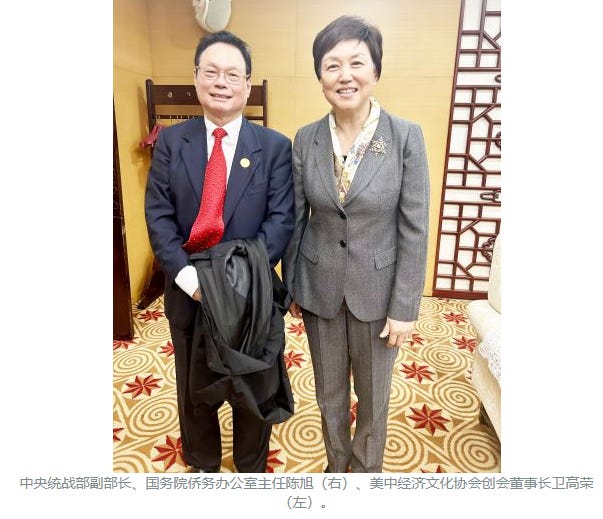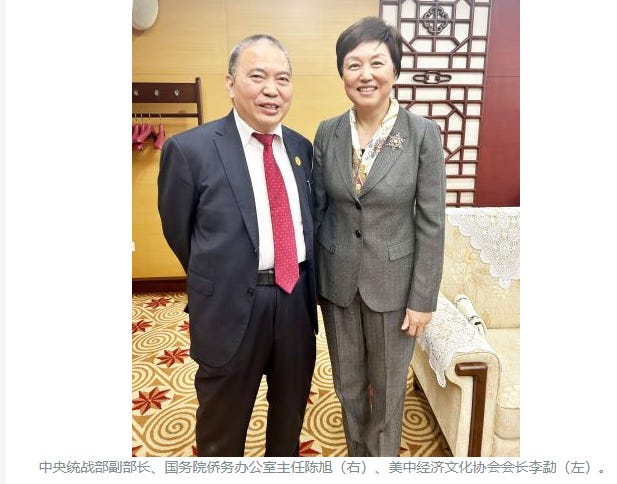From Taipei to Beijing: The Shadow Politics Behind Wei Gaorong and CAECA
(Chen Xu, Vice Minister of the United Front Work Department of the CCP Central Committee(right), CAECA Founding Chairman Wei Gaorong (left))
Introduction
For years, the Chinese Communist Party (CCP) has worked tirelessly to expand its United Front abroad—co-opting influential diaspora figures under the banner of “cultural exchange” and “economic cooperation.” A recent case drawing growing scrutiny is that of Wei Gaorong (卫高荣), founding chairman of the Chinese American Economic and Cultural Association (CAECA) based in North Carolina.
Although long perceived as a benign “community leader,” a deeper look reveals that Wei may represent a classic case of underground CCP alignment via United Front operations—possibly starting as far back as his youth under the Republic of China (ROC) in Taiwan.
Born in Taiwan, Serving Beijing
Wei was born in 1946 in Taiwan, under the Republic of China (ROC), but by his own admission, his political and professional trajectory shifted dramatically. In a 2021 speech hosted by CAECA in Charlotte, he said:
“From 1984 to 1986, I worked as a systems engineer for IBM China, training leaders from six Chinese institutions, including the National Meteorological Bureau and Dalian Port Authority.”
This time period is crucial: In the 1980s, Taiwan and China were in hostile political opposition. For a Taiwanese national to work so openly and deeply within Chinese state institutions—especially during China’s closed early reform era—raises pressing questions:
Was this merely business?
Or was it part of a broader political realignment?
The ROC government at the time strictly prohibited unauthorized contact with PRC institutions. If Wei held ROC citizenship then, his actions would have likely violated Taiwanese national security laws unless he had already “flipped.”
40 Years of CCP-Friendly Advocacy
Wei doesn’t hide his loyalties. He proudly claims:
“For over 40 years, I’ve maintained good relations with the Chinese Embassy in the U.S. and helped organize meetings with American governors, secretaries of state, and congressional members.”
This is precisely the type of “elite infiltration” strategy described by CCP doctrine under the United Front Work Department. The goal? Cultivate diaspora elites who can influence foreign political circles, especially in democratic societies.
Confirmed Ties to the United Front
In November 2024, the truth came into full view.
Wei and a delegation from CAECA were officially received by the Central Committee of the Chinese Communist Party’s United Front Work Department, including:
Chen Xu, Vice Minister of the United Front
Directors of the 9th and 10th bureaus, which handle overseas Chinese and foreign influence operations
This is not symbolic. It confirms that:
CAECA is now formally recognized and utilized by the CCP as a tool of state influence in the U.S.
Wei’s earlier role as “community elder” has evolved into that of a full-blown foreign policy asset.
A Trojan Horse Organization?
CAECA presents itself as non-partisan, supporting both Democratic and Republican Chinese-American candidates. But behind this neutrality lies a clear pattern:
Support candidates with ties to CCP-influenced networks (e.g., Lily Tang Williams, Zhao Yukong)
Avoid criticism of Beijing, even when discussing anti-Asian hate, COVID origins, or censorship
Promote “cultural pride” while deflecting attention from human rights abuses in China
This fits the mold of a “red Trojan horse”—a group embedded within American civil society to subtly redirect political discourse in China’s favor.
Was Wei a Former Underground CCP Member?
While direct membership records are secret, circumstantial evidence strongly suggests the possibility:
Born under ROC jurisdiction, yet chose Beijing over Taipei in the 1980s
Worked with sensitive Chinese institutions at a time when foreign access was tightly controlled
Maintained 40 years of alignment with CCP diplomatic missions
Directly received by the Central Committee's United Front department
In the context of CCP operational norms, this kind of access and trust would rarely be granted to someone without formal or informal Party ties.
Conclusion: A Strategic Risk to American Sovereignty
Wei Gaorong and CAECA represent a sophisticated, long-term United Front infiltration model—one cloaked in cultural identity, community outreach, and bipartisan rhetoric. But when leaders who once held ROC nationality now openly assist the CCP’s political expansion, it raises alarms beyond diaspora politics.
If American institutions, especially at the state and local level, fail to recognize these tactics, foreign interference won’t come through spy balloons—it’ll walk through the front door wearing a cultural diplomacy badge.
More details:
Li Meng (President of CAECA)
(Photo 1: Chen Xu, Vice Minister of the United Front Work Department of the CCP Central Committee and Director of the Overseas Chinese Affairs Office of the State Council (right), CAECA President Li Meng (left))





